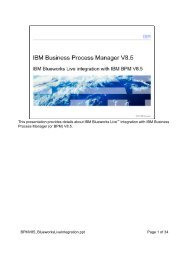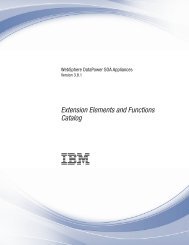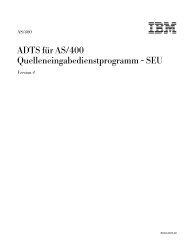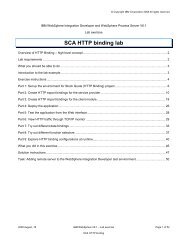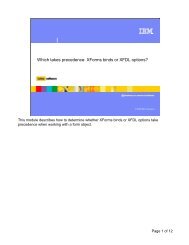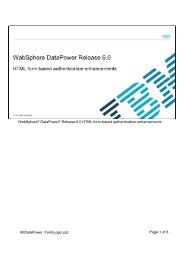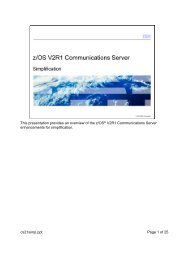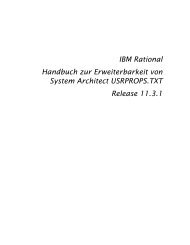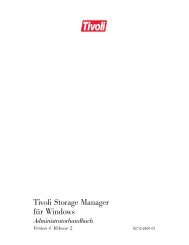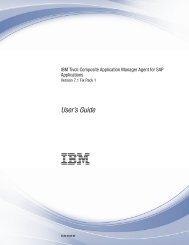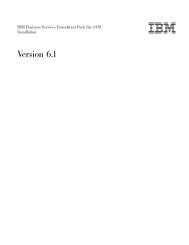IBM Tivoli Netcool/OMNIbus SNMP Writer Gateway: Reference Guide
IBM Tivoli Netcool/OMNIbus SNMP Writer Gateway: Reference Guide
IBM Tivoli Netcool/OMNIbus SNMP Writer Gateway: Reference Guide
You also want an ePaper? Increase the reach of your titles
YUMPU automatically turns print PDFs into web optimized ePapers that Google loves.
You can use the Gate.Reader.IducFlushRate property to specify the frequency (in<br />
seconds) at which the gateway reader requests updates from the ObjectServer<br />
using an Insert, Delete, Update, or Control (IDUC) communication protocol.<br />
The default value of the ObjectServer IDUC update interval is 60 seconds (as<br />
specified by the ObjectServer Granularity property). This default value is optimal<br />
for most systems. The default value of the Gate.Reader.IducFlushRate property is<br />
0, which equates to the default ObjectServer update interval. This means that,<br />
using the default setting of 0 seconds for the IDUC flush rate and the default<br />
setting of 60 for the ObjectServer granularity, the gateway reader gets its updates<br />
at 60-second intervals.<br />
You can specify a value greater than 0 for the Gate.Reader.IducFlushRate. This<br />
makes the gateway reader run at a faster rate (higher granularity) than the<br />
ObjectServer, thus enabling the gateway to capture more detailed event changes in<br />
systems where the ObjectServer itself has high granularity settings.<br />
Note: When both the ObjectServer Granularity property and the<br />
Gate.Reader.IducFlushRate property are set to their default values, the gateway's<br />
ability to forward alert updates is affected. If the Gate.<strong>SNMP</strong>.ForwardUpdates<br />
property is set to TRUE in these conditions, the gateway will not be able to capture<br />
all alert updates.<br />
Forwarding alert updates<br />
The gateway can forward updates to alerts that it has previously sent to the<br />
ObjectServer.<br />
The default gateway setting is to forward only new alerts to the ObjectServer. To<br />
forward alert updates, you must specify a value of TRUE for the<br />
Gate.<strong>SNMP</strong>.ForwardUpdates property. In effect, this reduplicates alerts (as opposed<br />
to the ObjectServer's deduplication mechanism).<br />
Note: The gateway never forwards alert deletion, journal, or details information.<br />
Store-and-forward mode<br />
When the remote <strong>SNMP</strong> writer is no longer active, the gateway can be run in<br />
store-and-forward mode. This ensures that the ObjectServer and database writers<br />
can continue to run.<br />
When the gateway detects that the target <strong>SNMP</strong> writer is not present or is not<br />
functioning (usually because the writer is unable to write an alert), it switches into<br />
store-and-forward mode. In this mode, the gateway stores everything it would<br />
normally send to the database in a storage file with a .store suffix. The default<br />
storage file is $OMNIHOME/var/NCO_GATE_snmp_.store.<br />
When the gateway detects that the destination server is back on line, it switches<br />
into forward mode and sends the alert information held in the storage file to the<br />
destination server. After all of the alerts in the storage file have been forwarded,<br />
the gateway returns to normal operation.<br />
Store-and-forward mode only works when a connection to the <strong>SNMP</strong> writer has<br />
first been established, used, and then lost. If the destination server is not running<br />
when the gateway starts, store-and-forward mode is not triggered and the gateway<br />
shuts down.<br />
22 <strong>IBM</strong> <strong>Tivoli</strong> <strong>Netcool</strong>/<strong>OMNIbus</strong> <strong>SNMP</strong> <strong>Writer</strong> <strong>Gateway</strong>: <strong>Reference</strong> <strong>Guide</strong>



